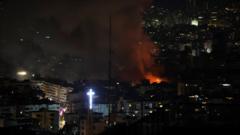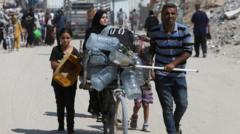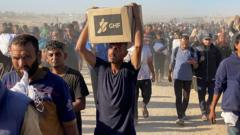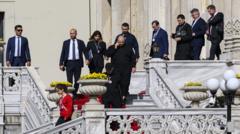On the eve of Eid Al Adha, Israel's actions provoke widespread condemnation and concern for civilian safety in Lebanon.
Israeli Air Strikes Target Hezbollah in Beirut Ahead of Eid Al Adha

Israeli Air Strikes Target Hezbollah in Beirut Ahead of Eid Al Adha
Tensions escalate as Israel conducts air strikes on southern Beirut, claiming to target Hezbollah's drone production facilities.
Israeli air strikes struck southern Beirut late Thursday night, targeting areas where Hezbollah is reportedly producing drones. This aggressive action comes just before Eid Al Adha, one of the most significant Islamic holidays, and has raised alarms about the safety and stability of the region. The Israeli Defence Forces (IDF) claimed to have identified an underground Hezbollah unit capable of producing "thousands" of drones, allegedly funded by Iranian sources.
Prior to the assault, evacuation warnings were issued for several buildings in the densely populated southern suburb, triggering a mass exodus from the area that led to severe traffic disruptions. Lebanese Prime Minister Nawaf Salam condemned the strikes as a "systematic and deliberate attack," emphasizing their impact on national security and the economy, particularly at such a sensitive time for the country with holidays and a tourist season nearing.
Plumes of smoke were reported rising from the targeted locations, reflecting the intensity of the strike. Lebanese President Joseph Aoun labeled the Israeli actions a "flagrant violation of an international accord," stressing that the attacks occurred just before a sacred religious celebration. Amid heightened tensions, Israel justified its military operations by arguing that Hezbollah's drone capabilities pose a serious threat, claiming that the activities are a violation of previous understandings between Israel and Lebanon.
Hezbollah has not responded to the air strikes, but an hour before the bombing, Israel's military spokesperson Avichay Adraee instructed residents in neighborhoods associated with Hezbollah, including Hadath, Haret Hreik, and Borj el-Barajneh, to evacuate. This escalation occurs despite a ceasefire in place between Israel and Lebanese forces, although not directly involving Hezbollah, which had been in effect for six months prior.
The current conflict is rooted in a history of tensions between Israel and Hezbollah that has resulted in severe casualties and the displacement of over 1.2 million people during previous escalations. The ceasefire established last November has seen some withdrawal of Israeli forces, yet ongoing air strikes targeting Hezbollah-associated sites have continued to cloud the prospects for lasting peace. As the situation evolves, many are left wary of what lies ahead for both Lebanon and Israel during this delicate period.





















